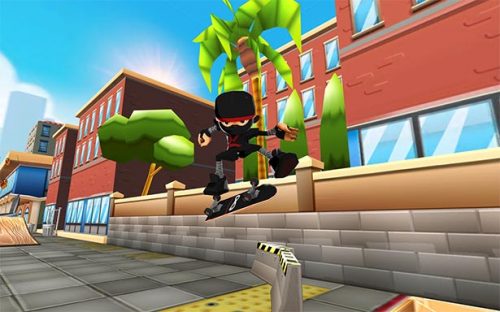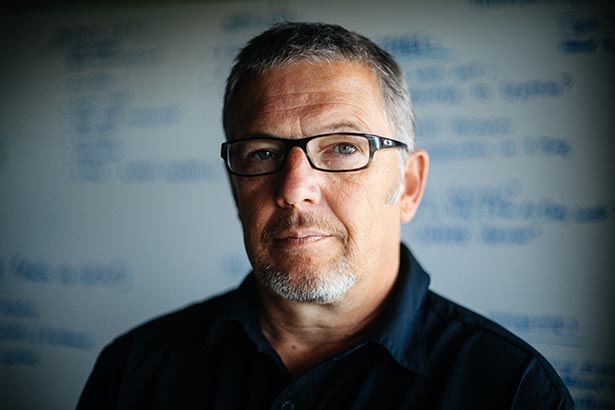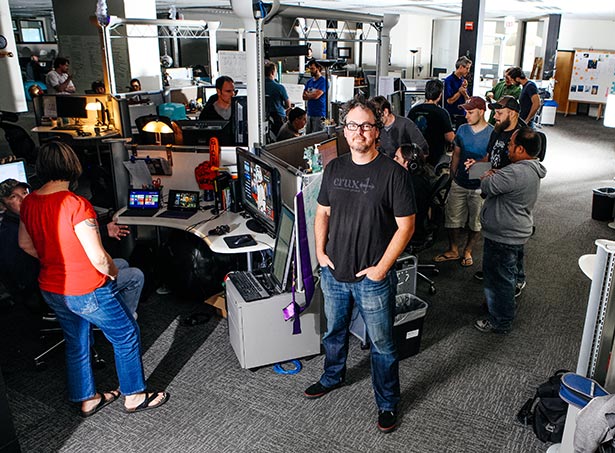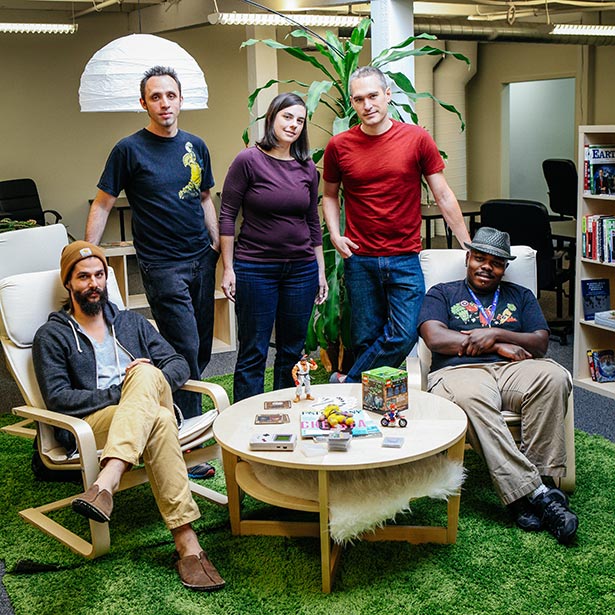
In an upstairs conference room overlooking the bustling marketplace at 5th and Pearl, men in colorful, graphics-splattered T-shirts are deep in conversation. “Eugene can be slow,” says Ted Brown, gesturing broadly to the group. “People here only make safe investments. Economies aren’t about selling lumber anymore, and we’ve got an explosion of creativity happening right here. Eugeneans don’t recognize that yet.”
Erase mental images of pale, middle-aged men coding furiously over glowing computer screens in their parents’ basements. The video game developers in Eugene are enthusiastic, engaging, smart and all about collaboration, working on projects that reach millions of people.
With more than 150 people working in game development in town, both in studios and independently, the seeds for success are already here.
Brown and his compatriots are independent video game developers, drawn to Eugene from the likes of L.A. and Seattle, and they believe the game industry here is ripe for the plucking — if Eugene investors make a move. Together, they’re putting on the Indie Game Convention Oct. 3-4, a celebration of games made by small, close-knit groups of developers working on multiple platforms, from personal computers to mobile phones.
Brown says he’s heard that Eugene has the highest number of game developers per capita in the country, and though that’s hard to confirm, one thing is certain: The upcoming Indie Game Con is a message that indie game makers are ready to burst onto the Eugene business scene.
The power of one
For those not immersed in the local gaming culture, it may come as a surprise that big games like Godzilla-Smash3 and Tomb Raider: Legend were made in Eugene. Video game development in town started with a single company called Dynamix and has since branched off into many businesses and startups, all stemming from a single source. Back in its heyday, Dynamix developed popular ’90s games including the puzzle game The Incredible Machine and a graphic adventure game called The Adventures of Willy Beamish.
 |
| Jeff Tunnell founded Eugene’s first game development company, Dynamix, in 1984. Photo by Todd Cooper. |
Like many big tech innovations, it started in the early 1980s. Jeff Tunnell owned a software store and spent his time with a bunch of recent South Eugene High School graduates who taught themselves to code on the Apple II and wrote games for fun.
Tunnell sold his software store and, along with fellow game developer Damon Slye, used the money to start Dynamix.
Over its history, Dynamix grew to about 250 employees, working out of an office along the Willamette River, and the company exchanged hands in a dizzying cycle of buying and selling.
Mark Frohnmayer, who worked for Dynamix and helped found indie game company GarageGames with Tunnell after that, says that Sierra Online bought Dynamix, only to sell it to CUC International, which then merged and formed a new company called Sundance, all out-of-state businesses. These kinds of big shifts are common in the industry as games change platforms.
“We rapidly found ourselves at the bottom of this giant company that was largely in hotel management,” Frohnmayer says. “At each one of those steps there were these mass layoffs.”
When Dynamix officially closed in 2001, small companies GarageGames, Buzz Monkey and Pipeworks were already taking form, started by former Dynamix employees and/or founders. Frohnmayer and the other co-founders of GarageGames sold the company in 2007 for around $80 million, but Buzz Monkey (acquired by Zynga) and Pipeworks still live and breathe, stationed in downtown Eugene and employing around 50 to 60 game developers each.
Indie spirit
Pipeworks is a studio, meaning it creates just about everything that goes into a game, including design, animation, sounds and story. “It looks closer to Pixar than anything else,” explains Lindsay Gupton, president of Pipeworks. “Within the building, we have designers, many different types of artists, lots of engineers or programmers, producers who run projects and people who test products. On a case-by-case basis we’ll contract with someone for certain roles, and we have a network of freelancers that we use.”
 |
| Lindsay Gupton, president of Pipeworks, says the latest version of Rollercoaster Tycoon will have a full multiplayer mode allowing players to work on theme parks collaboratively. Photo by Todd Cooper. |
Gupton says the gaming industry is somewhat like the movie industry, in that people come together to work on a project. But it differs from Hollywood in that in gaming, people tend to belong to a company fulltime.
“In the game industry, there are publishers and developers, and the lines can blur between them,” Gupton says. “We’re developers, and our clients are publishers.”
Gupton says a game usually starts when clients ranging from Microsoft, Atari and the BBC to the U.S. Army and Navy, approach Pipeworks and ask them to come up with an idea for a game or training simulation. From there, the game starts to form. Right now, Pipeworks is working on RollerCoaster Tycoon World, the latest version of a popular computer game published by Atari.
Both Pipeworks and Zynga have parent companies in California, and profits from game production travel south instead of staying in Eugene, although Gupton says that Pipeworks tries to hire local talent whenever possible.
Independent or indie gaming, on the other hand, aims to keep profits circulating in Eugene. And it bears a certain resemblance to the music industry. “It’s sort of like the difference between a band that signs with a major label and an indie rock band,” Frohnmayer says. “An indie is someone who’s saying, ‘I’m going to make my own stuff. I’ve got a creative vision that I’m going to make real.’ You’re taking on all of the creative risk of the game in order to find commercial success on your own.”
And that’s what indie game developer Ted Brown is all about. Brown moved to Eugene with his family in order to work for Buzz Monkey, but says he was unhappy with the type of social media game development the company was working on. He decided to strike out on his own, and his first wing flaps were not exactly successful.
“I tried to start a game called Ninja Baseball on Kickstarter with an artist friend from graduate school, but he bailed after the first week after he and his girlfriend broke up,” Brown says.
Once a Kickstarter campaign launches, the project must reach its fundraising goal by a pre-set date or all the donated money goes back to the donators, and Brown had to go about promoting the campaign by himself. “It ended on my birthday, and I thought, ‘This is either going to be the worst or best birthday.’” He laughs, saying, “It wasn’t the best. I fell flat on my face.”
Later on, with some help from a few Oregon financial assistance programs, Brown launched Epic Skater, a mobile phone game featuring a cute skater boy who kickflips and spins his way across a cityscape. Brown says the game has been downloaded about two million times.
“We’re not saying indies should usurp studios, because studios are the pillars of the industry here,” Brown says. “But a lot of studios are owned by companies in California, so their money doesn’t stay local. We want to keep local talent in Eugene instead of having them scatter.”
The scene in Eugene
Thanks to the latest innovations in technology, it’s easier than ever for indie game developers to make their own games. “GarageGames was all about supplying technology to indies, democratizing game technology so anyone could afford it,” says Tunnell, who now owns Spotkin, a small developer of educational games. “That’s what has happened now. There’s so much free technology out there. When we started GarageGames, it could cost $1 million for all the game technology you needed.”
All the pieces are in place for game development to grow in Eugene, local gamers say, and Eugene itself is uniquely positioned for success. Joe Maruschak, a former Dynamix developer who now runs a startup accelerator through the city of Eugene, says that software developers often have to live in large, crowded cities in order to work in their field.
“Here, you can buy a house. You can drive downtown. You’re within two hours of San Francisco on a plane. Oregon is beautiful,” he says. “Working here [in game development] has all the advantages without the hang-ups of a big city.”
The trick is maneuvering within an industry that changes gears every few years. Big game publishers peak and crash as gaming platforms rise and fall. Maruschak says that once upon a time, everything was made for CD-ROM, Xbox or PlayStation. Then, Facebook games surged in popularity.
“Games like Candy Crush Saga make about $1.5 million a day, but they also spend about half a million dollars a day on marketing, just to get the number of users they need,” Maruschak notes. “When there’s a big change, big things fail. If you depend on the publishers in California and they go under, you go under.”
Something similar happened to the Disney-owned Playdom studio in Eugene, which laid off half its employees in April before cutting nearly all the rest in August. Game developer Katie Bowman, who worked for the company making Facebook game Disney City Girl, says, “I’ve been in the game industry for only five years but it’s been pretty tumultuous.”
When she heard about the mass lay-offs in store, she decided to quit. She now does contract work for RockYou, a new social media studio in town that hired many of the former Playdom employees. “I’m not sure if I’ll continue or in what capacity,” she says.
It’s game time
Like any industry, game development has kinks to work out. Bowman says she doesn’t know what her future holds as far as gaming goes. “The future might be my husband and I making games for fun, or having our own little studio.”
She says she likes the gaming community in Eugene but worries about the time commitment, saying that there’s usually a minimum 40-hours-a-week requirement, which conflicts with her desire to have kids someday.
When she first started college, Bowman says, she read negative stories about what it was like to be a woman in the computer games software industry, and it almost scared her away from continuing in gaming. At Playdom, she says, her fears were alleviated.
“I came into it expecting a hard time, but honestly, it has been fabulous,” Bowman says. “I feel comfortable saying when people are out of line, and I had absolutely no problem getting promoted.”
She says the only sexism she experienced was from higher level California executives who visited the Eugene studio on occasion. When Bowman worked on Disney City Girl, a game about a college graduate who moves to New York City, she wanted the career options for the main character to be diverse and wide-ranging, including options for players to become doctors or politicians.
“It was disappointing to be told that women aren’t doctors,” she says. “Myself and at least one other woman in the studio thought it was great to offer a fashion designer career or a chef career, but we also wanted to see a science option or politics, something not stereotypical. That was met with very fierce opposition from the non-Eugene executives.”
Brown says it’s a continuing struggle in the gaming community nationwide. “One of the strengths of Eugene is that while it’s not ethnically diverse, it’s diverse in terms of ways of thought, and we’re eager to explore new topics.” He says he hopes to do just that at the Indie Game Con, where he’s arranged for game researcher Jennifer Allaway to talk about sexism in games.
Some women gamers feel the topic of women in gaming gets too much attention. “Instead of bitching about how females are apparently picked on and ignored, how about we don’t pay attention to the gender of the creator and just pay attention to the actual content?” says Nikki Serra, a gamer in Eugene.
Others, like local gamer Taylor Bowden, say that while a great variety of games exist, some female-friendly and some not, popular games still over-sexualize women. “It’s an issue synonymous with almost all American media, and it’s a symptom of a greater social problem,” she says.
Bowden, a painter, adds that the industry could benefit from creative people of all backgrounds, including female perspectives. “As talented indie developers are getting more exposure in gaming circles, these people have the chance to share something personal, unique and fun,” she says.
Gamification
Indie developers have another advantage: They’re less vulnerable to the highs and lows that larger game studios experience. Maruschak says Eugene would do well to insulate itself from those big shocks, and he says one of the ways to do that is by bolstering the local educational gaming scene. “I would like to see more educational games sold through different channels,” he says. “If we had more educational gaming in town, it could leverage our experience base here and we could employ more people.”
 |
|
(Left to right) Britt Brady, Will Bucknum, Ashley Flanagan, Ted Brown
and Michael Jones are members of the indie game community. Photo by Todd Cooper.
|
Brown agrees, saying that a huge amount of educational technology is focused in Eugene in the guise of “gamification,” a way of teaching something through a game. “With the Common Core coming out, there’s a sense that we’re not doing it right, that we’re not raising a generation of thinkers and doers, we’re raising automatons,” Brown says. “When you gamify an educational concept, kids are learning by doing.”
One example is Tunnell’s Spotkin, a small, local gaming company that specializes in educational games. Spotkin’s Contraption Maker, described on its website as “fun physics-based chain reactions,” is getting ready to ship, and is a more modern version of a game Tunnell made in the ’90s. The game features cartoonish characters designed by game artist Brian Hahn that interact with each other in surprising ways. Players must use a creative assortment of parts to set off a Rube Goldberg-style sequence of events, from anvils and balls to conveyor belts and adorable cats.
“It’s my favorite product I’ve ever worked on,” Tunnell says.
When it comes to gamifying, Maruschak has some criticisms of what he calls “edutainment.” He says kids want to play something that’s intrinsically fun and produces learning as a by-product, and he criticizes games that aren’t fun of their own merit. He says that his son learned to read when he was 4 by playing a game called Monster Rancher.
“He loved the game and loved raising his own monsters, but he couldn’t read yet. It took him six months but eventually he learned how to read the game enough to play the game on his own. We underestimate children,” he says. “Given the need to learn in order to play the game, he taught himself to read.”
Brown says Eugene stands out from other cities as a host for educational game developers, and he hopes the Indie Game Con will help bring together people of similar interests, growing the potential for future collaborations and gaming ventures.
“The definition of success that we laid down is that people come to have a good time, see games and feel inspired,” Brown says of the convention. “As Eugene grows, we want to have partners to help us shape this. If we get enough people here, we can’t fail. Mission accomplished.”
Indie Game Con is Oct. 3-4 at Eugene Mindworks, 207 E. 5th Ave. Admission $5, but admission is free with pre-registration at eventbrite.com.